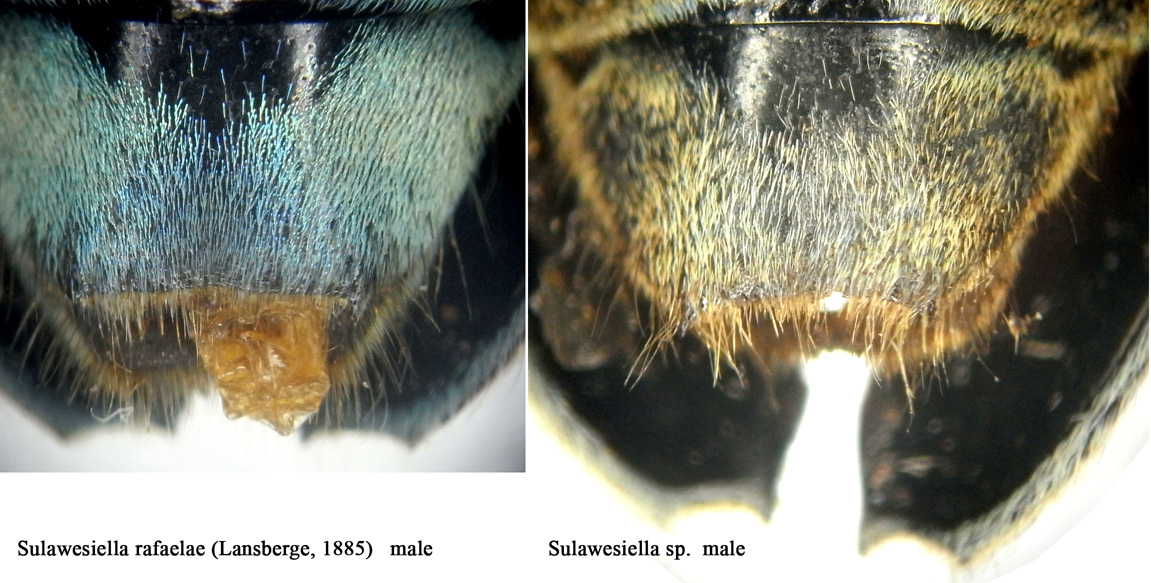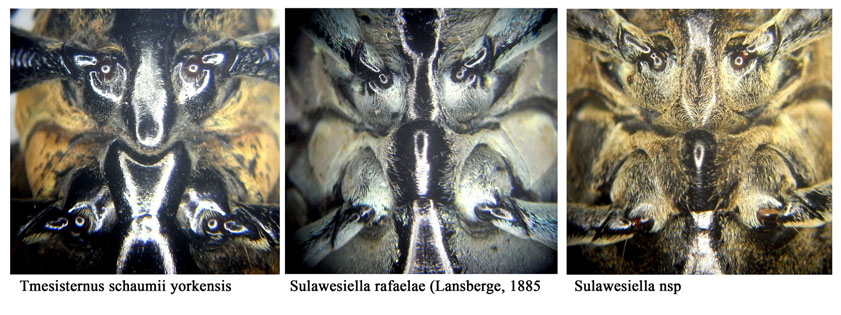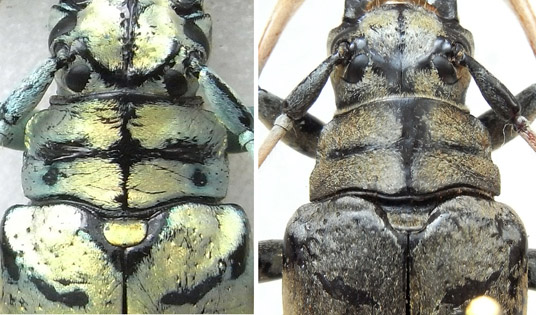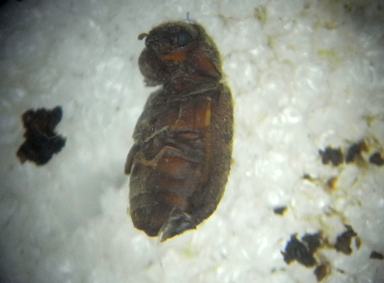| T O P I C R E V I E W |
| Xavier |
Posted - 21/10/2019 : 12:22:15

426.44 KB
Female 29 mm, male 27 mm, Pulu Pulu, Sulawesi, Indonesia. Despite the color, is it Sulawesiella rafaelae (Lansberge, 1885) as here ? |
| 15 L A T E S T R E P L I E S (Newest First) |
| Xavier |
Posted - 13/06/2021 : 10:25:48

292.85 KB
The genitalia of the male being destroyed, I don't see how to go further: I am not sure that the differences I see (length of the antennae, shape of the last sternite, sides of the pronotum, pilosity, etc.) are to be attributed to a new species or a variety...
Da die Genitalien des Männchens zerstört sind, weiß ich nicht, wie ich weiter vorgehen soll: Ich bin mir nicht sicher, ob die Unterschiede, die ich sehe (Länge der Fühler, Form des letzten Sternits, Seiten des Pronotums, Pilosität, usw.) einer neuen Art oder einer Varietät zuzuordnen sind...
|
| Francesco |
Posted - 30/05/2021 : 18:42:13

417.06 KB
Pair of Sulawesiella from Mamasa.
It seems to me that the pronotum of male is not so inflated as the previous image. It does not differ a lot from that of female.
The antennae of male are not as long as elytra. |
| Xavier |
Posted - 20/05/2021 : 07:16:56
The male has long, sharp spines; the female has blunt spines, reduced to simple angles.
But I have checked again more specimens of S. rafaelae: this species sometimes has short spines !
I think that spines are not a criterion for separating Sulawesiella and Tmesisternus:
In WEIGEL A. & WITHAAR G., 2006.Notes on the taxonomy of the genera Tmesisternopsis Breuning, 1945 and Tmesisternus Latreille, 1829 , with description of a new genus from Sulawesi, wrote for Sulawesiella rafaelae:
Venter: with gold-green metallic pubescence; all tergites with a triangular black area with apical base, the small spine at each side of the apex of last abdominal sternite hidden by strong hairs and barely visible; in male, apex of last abdominal sternite weakly concave truncate, and in female more convex truncate. |
| Xaurus |
Posted - 19/05/2021 : 23:52:37
yes, the mesoventral process corresponds to Sulawesiella, and what's about the spines at the end of the last sternite like in Tmesisternus, or ?? |
| Xavier |
Posted - 17/05/2021 : 20:15:42

121.68 KB
It is a Sulawesiella n sp.: The examination of the apophyses of the prosternum and mesosternum leaves no doubt; I have enough information to describe this new species. |
| Xavier |
Posted - 02/05/2021 : 09:30:12
Yes, I start the description of this species; do you have more material ? |
| Xaurus |
Posted - 02/05/2021 : 00:18:17
Wou, very interesting, your spms (male + female) have spines at the end of the last sternite, so it should be a Tmesisternus (like the former Tmesisternopsis from Sulawesi), the toment or pattern is a bit similar to T. albari Withaar but the pronotum is very different. |
| Xavier |
Posted - 01/05/2021 : 13:08:29
But I have check some males of Tmesisternus species in my collection : apex of last sternite with spines.
No spine at apex of males of S.rafaelae (checked too) . Anyway, it is enought to say that my species is not S.rafaelae. |
| Xavier |
Posted - 01/05/2021 : 12:50:21
Let's wait Andreas... |
| Francesco |
Posted - 01/05/2021 : 11:56:28
I think that Sulawesiella is a not completely supported genus... |
| Xavier |
Posted - 01/05/2021 : 11:21:48
With a spine at sides of the apex of last sternite, this species is not a Sulawesiella sp., but a Tmesisternus sp. |
| Xaurus |
Posted - 29/04/2021 : 23:42:47
yes, really different, its a bity the male genitals are feeding by a crime beetle, I my coll. there is a female too, looks very strange, I'll make a picture next days. |
| Xavier |
Posted - 28/04/2021 : 20:12:37

111.28 KB
Sulawesiella rafaelae (Lansberge, 1885) female vs sp. female
It is clearly not S. rafaelae. |
| Xavier |
Posted - 28/04/2021 : 16:13:55

93.6 KB
Keine Genitalien mehr im Hinterleib des Männchens, sondern Sägemehl und dieser Käfer! 
Ich werde also nach anderen diskriminierenden Zeichen suchen. |
| Xavier |
Posted - 30/12/2020 : 21:13:18
Yes, I have also often seen insect collectors who put their hunts in bottles of local alcohol, petrol or diesel because they didn't have acetic ether. I donate a lot of hunting equipment to local collectors when I can!
For this species, I will show you here the result of my study, but I don't have too much doubt.  |


